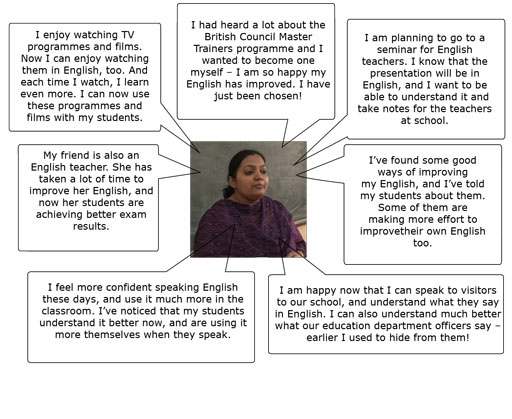1 Improving your English
Good teachers are continuously trying to improve their English. They find that this benefits them in many different ways. Read what these teachers say:
Now think about how improving your English could help you. Write your thoughts in the empty speech bubbles below or in your notebook. If you can, compare your thoughts to those of a colleague.

Whatever your thoughts, improving English can help you in your personal and professional life, and can benefit your teaching and your students too.
Case Study 1: Mrs Chakrakodi wants to improve her English and sets up an English club
Mrs Chakrakodi teaches English at a rural government secondary school. As a student, she enjoyed English and did well in exams. Now she reads and writes English confidently but is less confident with speaking and listening to English. She wants to develop these skills, but has found it difficult because she does not live and work in an English-speaking environment.
In a recent training session at our local DIET, I asked our trainer about how we secondary English teachers could improve our English. Our trainer told us about a radio show [TeachingEnglish, 2012]. In it, teachers talked about what they did to improve their English skills. One of them started an English club in order to practise speaking and listening.
Our trainer from the DIET thought that starting an English club was a very good idea, and we did too. She organised for teachers from neighbouring schools to get together once a week to talk only in English about whatever subject we like, or even about an article or something that everyone has read in advance.
The idea appealed to me as I live in a rural area where it is difficult to practise English. I always thought that I needed to practise speaking English with people who spoke it fluently, but after listening to the show, I realised that I just needed to practise – and that there were other teachers in the same position as me. So I started to go to this group regularly for an hour each week.
The first time we met, I felt a little embarrassed about speaking English, and I was worried that I would make mistakes. But as we have continued, I have become more confident, and I have learned not to worry about mistakes. What is important is that we all practise speaking – and listening to each other, of course!
At first we tried to prepare topics to talk about, but we found that we didn’t have much time for this. But we realised that we needed something to speak about, so now we take it in turns to choose a topic. Last week, for example, we talked about food. We swapped recipes, and talked about good and bad dishes that we had eaten. It was fun, and I got some good ideas for cooking too!
Sometimes I can’t go to the club because I am just too busy – and that’s true for all of us. But we decided that the club would take place no matter how many people are there. It’s helped me to become more confident at speaking English, and that means I am more confident in my classes too.
Activity 1: Improve your own English
In Case Study 1, Mrs Chakrakodi identified that she is less confident at speaking and listening to English, which is why she started going to the English club. Now read Table 1, which is something she filled in to describe her English skills.
| Type of skill | My English skills | What I can do to improve |
|---|---|---|
| Reading English | I can read and understand most English texts. I read English newspapers when I can. Sometimes I don’t know the vocabulary. | Continue to read texts as much as possible. Use a dictionary to look up words. |
| Writing English | I can write texts quite accurately. | Right now I will not work on writing. I prefer to spend my time developing my speaking skills. |
| Listening to English | I don’t have many opportunities to listen to English. | Listen to the news in English once a week, on TV or the radio. Go to English club once a week. |
| Speaking English | I don’t have many opportunities to speak in English. | Go to English club once a week – and speak as much as I can during the session. |
Now complete the table for yourself, using Table 2 or a copy. First, make some notes about your abilities and the things you already do in English. Your notes might be similar to the teacher of Case Study 1, or your case might be very different. Identify any areas where you could improve your English. Make some notes about what you think you could do that would help you improve. If you can, discuss these ideas with a colleague.
| Type of skill | My English skills | What I can do to improve |
|---|---|---|
| Reading English | ||
| Writing English | ||
| Listening to English | ||
| Speaking English |
Why you should consider developing your English

